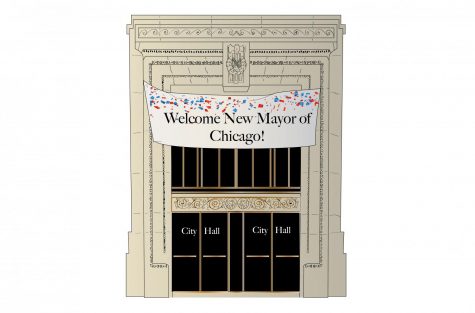EDITORIAL: Lightfoot met with hope and apprehension
April 11, 2019
Lori Lightfoot won the April 2 mayoral runoff in a landslide, becoming Chicago’s first openly-gay and first black female mayor. Winning in Chicago has made Lightfoot one of the most prominent politicians in the country overnight.

The election of a woman who lives on the intersection of diverse identities means a lot to Chicago’s marginalized communities. Even having a runoff election between two black women proves that Chicago is ahead of other places in the country. LGBTQ people and people of color are severely underrepresented in government across the board, so seeing a black lesbian hold major political office is progress.
This election provides hope for further representation at the highest levels of government. The U.S. is supposed to be a representative democracy, and Lightfoot’s election is one of the first in the country to show that principle to its fullest extent. The rest of the nation should take this election as a message: Marginalized people are a powerful political force, and they are going to continue making bigger strides for the betterment of their communities.
Though this is a historic moment that deserves to be honored, we need to look beyond Lightfoot’s identity and hold her accountable as she becomes mayor in May. Before this election, Lightfoot served as president of the Chicago Police Board and as an assistant U.S. attorney. Her ties to the police are reason enough to give us pause as she takes office. In light of the Van Dyke trial and the Jussie Smollett case, we need a mayor we can trust to use CPD resources effectively and curtail police violence.
Lightfoot must understand that a major part of her election was due to marginalized groups wanting to see themselves represented in Chicago politics. This is a huge responsibility and one she cannot take lightly. It is impossible to meet the needs of people of color and the LGBTQ community while justifying excessive use of force by police, as she did in the early 2000s after reviewing a fatal shooting caught on video, according to a Feb. 20 Chicago Tribune report. Lightfoot went against the recommendation of investigators who would have seen the offending officer fired.
LGBTQ people and people of color are disproportionately affected by police violence. Nationwide, 14% of black transgender people who interacted with police reported physical assault by the police and 6% reported sexual assault in 2014, according to a Human Rights Campaign report. These crimes often go underreported and ignored. Lightfoot will be the mayor of Chicago, which includes being mayor of those affected by police violence.
If representing the marginalized and bringing the light in—as she said during her campaign speech—is our new mayor’s goal, we must watch closely as she navigates her first political moves to see if she lives up to that. She will prove to us what kind of mayor she is going to be. Lightfoot is taking office at a time when Chicago is aching for change and reform. If she can meet that challenge head-on, she has the potential to serve those who elected her in ways they want and deserve.







